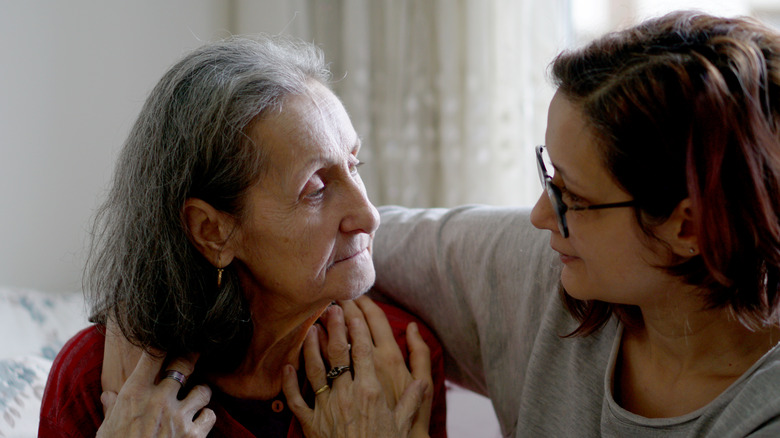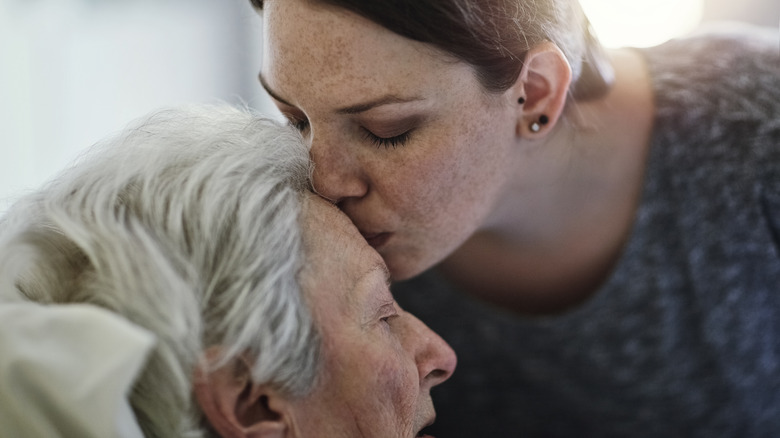The 7 Stages Of Dementia Before Death Explained
When someone you love begins to display symptoms of cognitive decline, it can be alarming. While some degree of forgetfulness is natural and not typically a cause for concern, memory issues that begin to affect a person's lifestyle, safety, and overall wellbeing may be a sign of dementia. This is a term used to describe a collective of cognitive conditions that affect a person's ability to make proper judgements, think clearly, and solve problems.
Over time, these symptoms grow worse and eventually disrupt the person's ability to care for themselves completely. This is when a medical professional is needed to confirm a dementia diagnosis. At this stage, family members can also glean a better understanding of what they'll need to do to help their loved one. It's just as important to recognize what dementia itself means. "Dementia really isn't a disease itself. Instead, dementia is a group of symptoms that can be caused by many different diseases," explains Dr. Sanjay Asthana of the National Institutes of Health (NIH). "Symptoms of dementia can include problems with memory, thinking, and language, along with impairments to social skills and some behavioral symptoms."
The most common form of dementia is Alzheimer's disease, affecting nearly 60% of diagnosed people. The second most common is vascular dementia, which impacts up to 30% of people diagnosed. Because the symptoms of dementia are progressive and advance over the course of seven stages, it is likely to go undiagnosed until the effects become more noticeable.
Stage 1: No cognitive impairments are present
Unless a person undergoes very specific medical testing, it's very unlikely that they will be diagnosed with any type of dementia in the first stage. At this stage, referred to as "preclinical," there are no obvious symptoms present. The person typically functions with their usual independence, managing everyday activities like personal care, cooking, driving, and working without issue. Because it goes undetected, it's not known how long the first stage lasts.
Although the outward symptoms that affect the person's wellbeing and safety are not obvious at this stage, there are several complex changes that may affect the dementia patient's brain. Those include the incidence of tau tangles and amyloid plaques as they begin to form and progress in the brain. Doctors can perform specific diagnostic tests, including PET scans of the brain, cerebrospinal fluid sampling, blood work, to identify the key biomarkers that indicate a potential dementia diagnosis. A person who has undetected Alzheimer's disease, for example, may have elevated beta-amyloid proteins in their blood. That's an indication that the protein is clumping in the brain and causing plaques that affect normal cognitive function.
Unfortunately, medical providers don't typically perform screenings for preclinical dementia — and not everyone who eventually develops dementia will always have indicative biomarkers. However, per a review published in the European Journal of Ageing, performing biomarker testing could be useful in helping slow the progression of dementia among those who are affected, as well as influencing the efficacy of treatments in the future.
Stage 2: Very minor cognitive impairment develops
Minor memory problems begin to creep up in the second stage. However, "minor" is the key word, as they are rarely identifiable or notable enough to alert someone to the possibility of a serious medical problem. They simply aren't significant to the point of affecting the person's everyday life, safety, or wellbeing. The second stage is still considered early.
However, it's still smart to be mindful of the small changes that might occur. At this stage, they're extremely subtle, but may include forgetting names and misplacing items. They essentially mirror the same type of forgetfulness that's common in many people as they grow older. The difference is that these symptoms persist, and it's usually the person's family or close friends who are first to notice the change and not the person themselves. In general, the period comprising the first and second stages, when the signs of a possible problem are minimal, tends to last for approximately two years.
Even though you may be concerned, it's important to note that doctors can't typically diagnose dementia at this stage without performing biomarker testing. The person and their loved ones may even attribute the memory lapses to mild cognitive decline due to normal aging. The test results serve as a baseline, which the doctor can then use for comparison if cognitive function worsens. The benefit of performing testing at this stage is that the doctor may be able to prescribe treatments that slow the progression of dementia.
Stage 3: Mild cognitive impairment becomes apparent
While the second stage can last for up to 15 years without any notable symptoms, by the time a person reaches the third stage of dementia, their memory problems become even more apparent to their family and friends. While the subtle signs associated with stage two may have been slightly noticeable and mildly concerning, they become far more significant in the third stage because they begin to affect the person's quality of life more so than their ability to function independently.
For example, they may forget names, appointments, directions, and other important details. It's also not unusual to have trouble making decisions, to forget words, and for work performance to suffer. These symptoms may continue for several years. Co-director of the Penn Memory Center, Dr. David Wolk, MD, says to Penn Medicine, "For many, this stage brings noticeable changes, and it will become harder to blame age. It's common to be diagnosed in this stage, because this is when a person's daily routine becomes more disrupted."
Another common symptom affected people may experience is anxiety related to diminishing cognitive function. Denial is a common response to the symptoms, but it's important to seek medical attention promptly for testing when they become more apparent. This is the best way to take a proactive approach to dementia, as a medical professional can provide suggestions for treatment and develop a comprehensive care plan that takes the person's unique needs into account.
Stage 4: Moderate cognitive decline causes obvious symptoms
The fourth stage of dementia is significant because the symptoms begin to affect the person's life to the point that they need help. Explains Dr. David Wolk, MD, to Penn Medicine, "In this stage, damage to the brain often involves other aspects of cognition outside of memory, including some difficult with language, organization, and calculations. These problems can make it more challenging for your loved one to perform daily tasks." If a person is not diagnosed in the third stage because their symptoms are still on the milder side, it's likely they'll be diagnosed during stage four.
It becomes more difficult to complete everyday tasks, like doing the dishes, paying bills, buying groceries, and going to events. The person might withdraw from their usual activities and lose interest in things that they once enjoyed. This is about more than just denial, says Dr. Wolk. "Because of the damage to the brain cells, your loved one may also experience other personality changes, such as feeling suspicious of others, having less interest in things, or feeling depressed. These kinds of symptoms can often be improved with medications."
The combination of behavioral changes coupled with the marked diminishment in cognitive function is enough for a medical professional to make a concrete dementia diagnosis at this stage. It's smart to develop a care plan for the future now. This may involve determining where the person will live as the disease progresses and who will provide ongoing care.
Stage 5: Moderate to severe cognitive impairment affects independence
In the fifth stage of dementia, changes to a patient's life become significant enough that the person may require day-to-day assistance. This is primarily because the person may pose a risk to their own safety. They may struggle to remember or identify familiar faces and objects, and they might have trouble eating or bathing.
Emotional symptoms may also cause even more distress, not just to the patient but also to the person's loved ones. Changes in brain chemistry are largely responsible for these behavioral developments. Sometimes, people in the fifth stage of dementia start seeing or hearing things that aren't there. They may also become delusional, believing incorrect things about people who love them. It's not uncommon for them to feel paranoid, too. While hallucinations and other unrealistic beliefs are distressing to the person's family, it's important to remember that they are hallmarks of the disease and in no way indicative of the person's genuine feelings.
Psychiatrist Dr. Stephanie Collier, of the McLean Hospital associated with Harvard, says, "As dementia progresses, the person loses brain cells associated with memory, planning, judgment, and controlling mood. You lose your filters." Adds Lydia Cho, a neuropsychologist at McLean Hospital, "Due to declines, older adults with dementia can seem like children. But people are generally more patient with children. You should consider using that approach with older adults."
Stage 6: Severe cognitive impairment develops
People with stage six dementia require significant help with everyday tasks. The severity of the symptoms is such that the person may become completely dependent on a caregiver, be it a family member or a professional. The hallmark of the sixth stage of dementia is the remarkable decline in independence. Affected individuals may be able to utter a few words, but they often can't find a way to articulate their thoughts. Moreover, they can no longer recognize their closest family and friends, although the people may appear vaguely familiar to them.
According to Dr. Valeria Baldivieso, MD, of Advent Health Orlando, "Often, people in stage 6 are no longer aware of present events and can't accurately remember the past. They progressively lose the ability to take care of daily living activities like dressing, toileting, and eating. They are still able to respond to nonverbal stimuli and communicate pleasure and pain through their behavior."
At this stage, which can last for approximately two-and-a-half years, the person has likely graduated to a full-time care requirement. They may have a caregiver who resides in the home, or they may live in a memory care facility. Sometimes, patients may also begin to wander. This is an enormous safety risk, as it's easy for the person to lose their way. Being under constant supervision is important to prevent these kinds of situations.
Stage 7: Very severe cognitive impairment in late-stage dementia
The final stage sees the patient develop life-altering symptoms of cognitive impairment. At this time, the decline affects memory, the ability to process information, and day-to-day functions such as walking, talking, and eating. A person at this stage requires full-time support for their safety. This stage sees the patient lose their ability to respond, and they may even have trouble swallowing.
At this stage, the person's safety and comfort are primary concerns. "Total support around the clock is needed for all functions of daily living and care," shares Dr. Valeria Baldivieso of Advent Health Orlando. "Duration is impacted by quality of care and the person's overall health, but the average length is one to two-and-a-half years."
In addition to round-the-clock care, a person in the final stage of dementia depends on the administration of regular medications. They may also receive mood-stabilizing agents to help them stay calm. Concerns such as pressure sores and oral decay are common side effects that must be monitored, too. What's important to remember during this heartbreaking time is that while the patient may not remember a face or a name, they are conscious and may respond well to very gentle activities, such as sitting next to an open window or listening to soothing music. These kinds of activities also have a bonding effect, and may bring comfort to loved ones.







